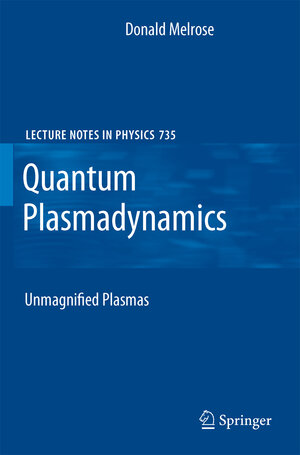
×
![Buchcover ISBN 9780387739021]()
From the reviews:„The ten chapters and 464 pages book is one of Lecture Notes Series of Monographs on Physics and gives the best introduction to the quantum electrodynamics and the kinetic theory relativistic and non-relativistic charged particles. The author of the book is focusing on interactions between charged particles and the electromagnetic field. … Materials of the most important part of the book are supported by illustrations. … useful for advanced graduate students, scientists and all who are interesting on the plasma physics and the confinement systems.“ (M. J. Canfell, Zentralblatt MATH, Vol. 1158, 2009)“Melrose’s addition to the Lecture Notes in Physics series provides an introduction to both QED and the kinetic theory of charged particles, while detailing the synthesis of these fields into the modern subject of quantum plasmadynamics (QPD). … this first volume of the collection focuses only on unmagnetized plasmas. … this book may be useful for advanced graduate students and working scientists interested in the dynamics and behavior of quantum plasmas.” (Stephen D. Pankavich, Mathematical Reviews, Issue 2012 a)
The idea of synthesizing quantum electrodynamics (QED) and the kinetic theory of plasmas ? rst occurred to me in the early 1970s [1, 2]. The project to do so has been carried out bit by bit over the subsequent years. The name “quantum plasmadynamics” (QPD) is my own jargon [3] for the synthesized theory. Both QED and the kinetic theory of plasmas areconcerned with the int- action between charged particles and the electromagnetic ? eld, but they are radically di? erent in the way the interaction is described. The kinetic theory of plasmas is a collective-medium theory: a plasma is not a collection of - dependent particles in a given electromagnetic ? eld, but a medium in which the particles collectively modify the ? eld, and the ? eld modi? es the par- cles. The charge and current densities associated with the particles are part of a self-consistent ? eld. Conventionally, the kinetic theory of plasmas is a classical theory: the motions of particles are treated using classical dynamics.




